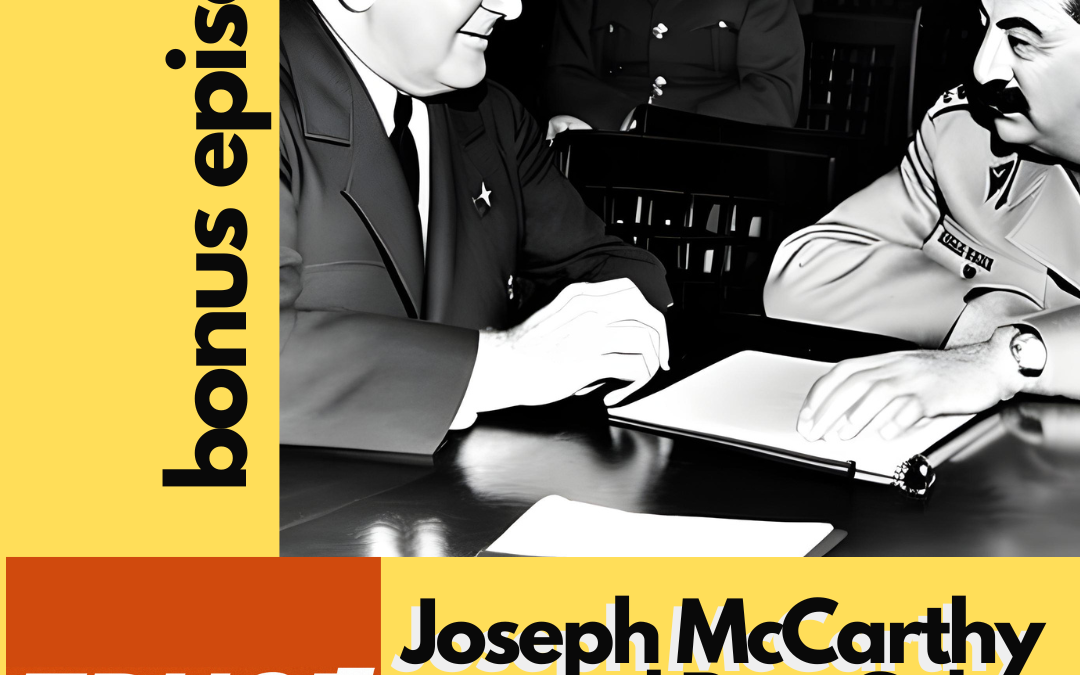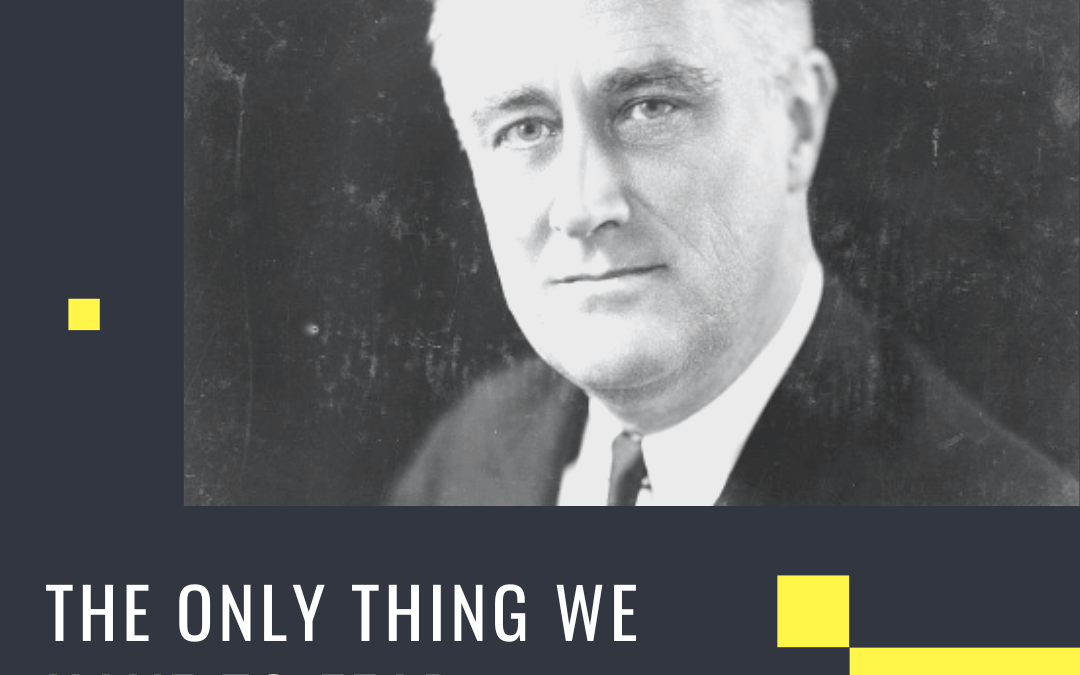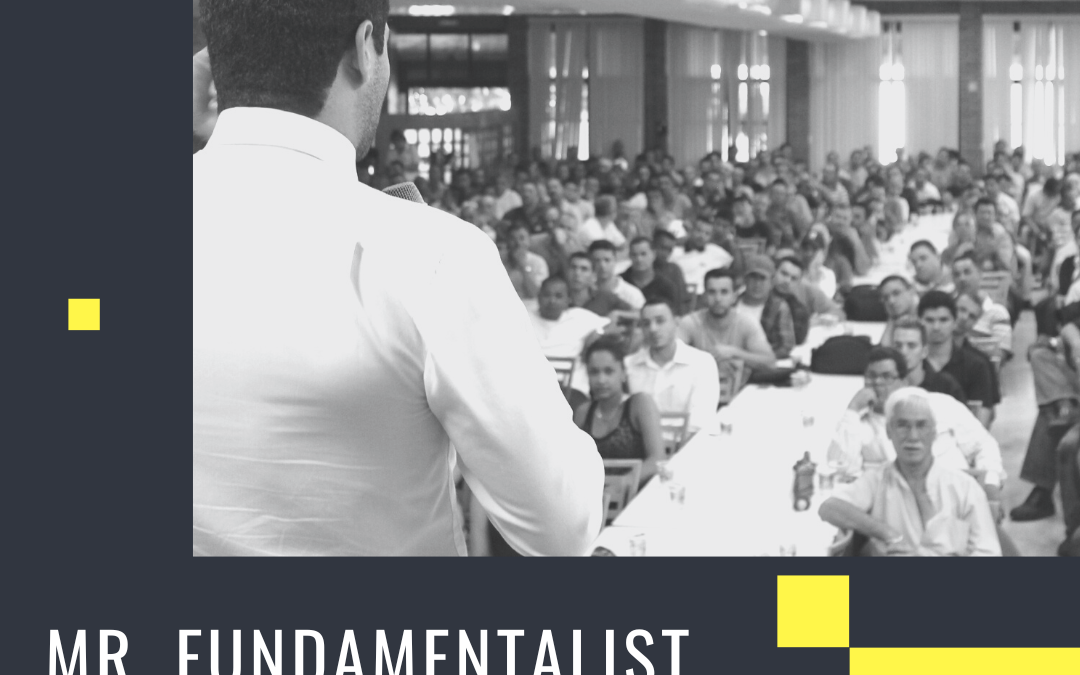
by Chris Staron | Sep 12, 2023 | Episodes
Give to help Chris make Truce!
Joseph McCarthy’s Search for Communists in the American Government
Joseph McCarthy was an unexceptional junior congressman from Wisconsin. He grew up brawling in the streets, playing cards, and embellishing his stories. Then, during a Lincoln Day address in 1950, Joseph McCarthy told an audience that he had a list of 205 communists working in the government. Within days, he was a household name.
McCarthy started “investigating” suspected communists in the American government, focusing on the US State Department. Along the way, he brought in a young lawyer named Roy Cohn. Cohn was already known for his work sending Julius and Ethel Rosenberg to the electric chair. Now, he and McCarthy bullied and cajoled during private hearings. Being labeled a communist, or even a suspected communist could ruin a person’s career. People committed suicide rather than face their scrutiny.
Roy Cohn was Donald Trump’s Mentor
Their reign lasted four years, ending in the televised broadcasts of the Army-McCarthy hearings in which a lawyer asked if McCarthy had any decency. That was pretty much it for McCarthy. But Roy Cohn went on to have a well-connected career, providing legal services for the mob and Rupert Murdoch, owner of Fox News. He also became a mentor to a young real estate mogul named Donald Trump. Famous people like Andy Warhol attended his birthday party at Studio 54. Cohn died of AIDS, something that was killing gay men rapidly in the 1980s, though he denied he ever had it.
This is the story of two men allowed to prey on the fears of the American people for their own gain. One fell hard, the other found himself fighting against his own people.
Larry Tye, author of “Demagogue”
In this episode, Chris interviews Larry Tye, author of the book “Demagogue”. He’s also the author of “Satchel: The Life and Times of an American Legend” and “Bobby Kennedy: The Making of a Liberal Icon”.
Sources:
- “Demagogue” by Larry Tye
- Helpful article about the Rosenbergs
- Article about Klaus Fuchs
- McCarthy’s speech in Wheeling, WV
- New York Times, February 23, 1954. Pages 16-17 “Transcript of General Zwicker’s Testimony Before the McCarthy Senate Subcommittee”
- Video from Army-McCarthy hearings (forward to the last 20 minutes if you want to jump to the stuff I used)
- The guest list for Roy Cohn’s birthday at Studio 54
Discussion Questions:
- Why do we love demagogues?
- Who are other demagogues in American history?
- The threat of communists in the government in the 1950s is sometimes downplayed. Do you think it was a real concern?
- McCarthy ran for Congress in an illegal way while still in the Marines. How do you feel about that?
- Roy Cohn sometimes went against his own people, claiming that gay people did not deserve equal rights. What might have been his motivation?
- Do you see any crossover between McCarthy, Cohn, and Donald Trump?
- Cohn died of AIDs in the 1980s when the disease was at its peak. Why might he have wanted to keep his illness a secret?

by Chris Staron | Jun 13, 2023 | Episodes
Give to support the Truce Podcast
What did FDR mean by “the only thing we have to fear is fear itself?”
On March 4, 1933, FDR delivered his inaugural address. In it, he used the phrase “the only thing we have to fear is fear itself”. I did a little searching and this phrase is used a LOT in Christian books. So often. But it almost always refers to the fear one person has in their heart. In reality, it is a comment on collective fear. The Great Depression started in 1929 and was exacerbated by a bank run in which Americans lost faith in the value of our currency and the banking systems.
Do we believe in God’s economy?
That is an important distinction. FDR’s speech is about collective fear. As I’ve contemplated the modernist/fundamentalist debate this season, I keep returning to the idea of fear, not in the US economy but in God’s economy. He commands us to love the Lord, keep His commands, love our neighbors, turn the other cheek, and give to those who ask of us. Why do we forget to do this important work? Could it be because we’ve lost faith in God’s economy?
This episode features a clip from my discussion with Jacob Goldstein, former host of NPR’s Planet Money podcast and the current host of Pushkin’s What’s Your Problem? podcast. His book is Money: The True Story of a Made-up Thing.
Select Sources
Discussion Questions:
- Why does it matter that FDR’s quote “…the only thing we have to fear is fear itself” is a collective statement and not one about individual fear?
- What are some identifying features of God’s economy?
- Do you trust in the way that God tells us to do things?
- When was the last time you prayed for someone who you don’t like?
- Do you believe in turning the other cheek?

by Chris Staron | May 30, 2023 | Episodes
We’ve been told that “the ends justify the means”. But shouldn’t Christians focus more on the means than the ends?
“The ends justify the means” is a phrase we hear occasionally. Often it is used to justify bad behavior, so long as it creates a profitable outcome. But we Christians know that we are called to live righteous lives. Are we people of the ends, or should we be known as a people of the means?
Chris is joined this week by Pastor Ray McDaniel of First Baptist Church in Jackson, WY, and his twin brother Nick Staron to discuss this important issue.
Discussion Questions:
- What does “the ends justify the means” mean?
- How have you seen that philosophy played out?
- Is that something you believe?
- How would things change if we focused more on the way we do things instead of our goals?
- How have fundamentalists justified their goals with poor behavior? How have modernists?

by Chris Staron | Nov 22, 2022 | Episodes
William Bell Riley was the real “Mr. Fundamentalist”. And few have heard of him.
So far this season I’ve covered William Jennings Bryan, a man who enjoyed the nickname “Mr. Fundamentalist”. But he wasn’t really a fundamentalist. Experts point to another man as the true face of fundamentalism. That man was William Bell Riley. He was a famous preacher in his day, bouncing around the midwest until he settled in Minnesota. He founded the Northwestern schools to spread his vision of Christianity and picked debates with modernists at the University of Chicago. He formed the World’s Christian Fundamentals Association to help deliver denominations from modernism.
But… he lost. A bunch.
In this episode we explore the life of William Bell Riley to discover why he and the fundamentalists burned brightly, only to fizzle out a few years later. William Bell Riley was the real “Mr. Fundamentalist”. And few have heard of him. That is for good reasons. Riley was popular in his circle and had a big impact. But his lasting legacy is now tied to his schools because he helped take the movement underground and out of the usual channels of public life.
Helpful Links:
- God’s Empire by William Vance Trollinger
- Minnesota History article about Riley
- New Hampshire Confession
- Fundamentalism and American Culture by George Marsden
- The Evangelicals by Frances Fitzgerald
Discussion Questions:
- How should we react to heresy?
- Do you look for strong leaders like William Bell Riley or do you prefer calm leaders? Why?
- Do you have a creed you live by? Does your church profess one? Why or why not?
- How do Bible schools shape our world? Have they impacted your life or the lives of friends?
- Riley and his friends lost in part because they were all trying to be leaders. Do you think you could submit to the leadership of others? If so, who?

by Chris Staron | Oct 11, 2022 | Episodes
The Fundamentals of the Christian faith
Between 1910 and 1915 a collection of 90 essays was distributed by two wealthy oil magnates. These essays attempted to nail down the basics of the Christian faith and counteract the growing modernist movement. “The Fundamentals” is often mentioned in history books about Christian fundamentalism, but it is rare for anyone to discuss the essays themselves. So I thought we should break down at least 6 of them together!
I’m joined this episode by some good friends to introduce you to “The Fundamentals”. This influential time capsule document takes us inside the proto-fundamentalist movement, just before it really took off.
Discussion Questions:
- What would you include in your own list of fundamentals?
- Is creationism fundamental? What is the role of evolution in our modern theology?
- The fear of evolution wasn’t just about people thinking we’d come from chimps. It also revolved around concerns of people applying evolution to other areas of life. How have you seen evolution applied to other studies?
- Is the Bible inerrant? What does that mean?
- Have you read the full Bible yourself? Why or why not?
Essays we read:
- “My Experience With the Higher Criticism” by JJ Reeve
- “The Deity of Christ” by BB Warfield
- “The Certainty and Importance of the Bodily Resurrection of Jesus Christ from the Dead” by Reuben Torrey
- “Science and Christian Faith” by James Orr
- “Evolutionism in the Pulpit” by “An Occupant of the Pew”





